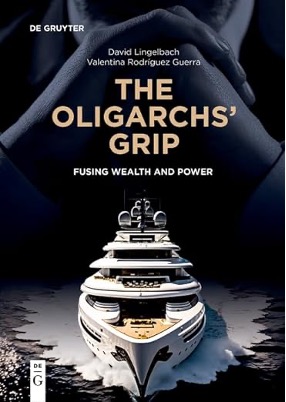Philanthropy
Philanthropy in The Oligarchs’ Grip
Forthcoming book describes strategies oligarchs use to fuse wealth and power, including philanthropy.


In their forthcoming book The Oligarchs’ Grip: Fusing Wealth and Power, David Lingelbach and Valentina Rodríguez Guerra develop and present an academic model of the strategies oligarchs around the world employ to fuse wealth and power. It provides some helpful insight into how oligarchs use a number of mechanisms to gain and maintain their overwhelmingly strong politico-economic positions—including, in many cases, philanthropy.
Lingelbach is a professor of entrepreneurship at the University of Baltimore’s Merrick School of Business, and Guerra is a graduate student in business administration at the Universidad Nacional de Colombia.
For The Oligarchs’ Grip, they rely on case studies of 16 oligarchs active since 1946 in 13 countries, selected from a comprehensive dataset they created of 178 oligarchs going back much further in time. By their definition, oligarchs possess three types of power: decision-making, agenda-setting, and ideological. Their American case-studied oligarchs are Al Gore, Charles Koch, and Larry Page. Seven of the oligarchs in their larger dataset are U.S. presidents.
Acting primarily in their own self-interest and seen as acting unethically, oligarchs distort market efficiency by “engage in unproductive or destructive economic activities that undermine productivity, leading to lower economic growth and poorer prospects for equitable wealth and income distributions,” according to Lingelbach and Guerra. They “act corruptly to gain access to wealth-generating activities not available to others without connections,” and “they simply steal state assets paid for by a society’s general resources. Lingelbach and Guerra note that it “is also possible to be a good oligarch,” a category into which they place American Herbert Hoover for his post-World War I leadership of the American Relief Administration that funded and conducted life-saving humanitarian work in Europe.
“Oligarchs sometimes seek to balance the ethical scales by engaging in philanthropic activities,” they write, citing Russian Mikhail Fridman as an example. “He co-founded the Russian Jewish Congress in 1996 to revive Jewish life in Russia” and in 2007, “he co-founded the Genesis Philanthropy Group, which awards a $1 million annual prize to members of the Jewish community who have achieved significant professional success. Some of the awardees are themselves oligarchs (e.g., Michael Bloomberg, who received the inaugural award).”
The Oligarch’s Grip also references in detail some of Lebanese oligarch Rafic Hariri’s giving. “By 1977, Hariri became a philanthropist in his hometown Sidon, the country’s third largest city and one of the most important Phoenician ports,” according to Lingelbach and Guerra.
He donated to a former school operated by the al-Maqasid Foundation, a Sunni Muslim organization that oversaw schools, a hospital, orphanages, and various social welfare activities. In 1979, Hariri expanded his philanthropy further through the creation of the Islamic Institute for Culture and Higher Education (the Hariri Foundation) and the subsequent building of Kfar Falous east of Sidon. Kfar Falous was a $300 million project comprising a university, hospital, and other cultural facilities, located in one of the poorest parts of Lebanon. … [T]hese philanthropic projects, initiated in the middle of a civil war, were well timed and established Hariri as someone with agenda-setting power in Lebanon.
Philosophically, and Strategically
Philosophically, “Aristotle recognized oligarchy and oligarchs as a deviant constitutional form—deviant because it was less just. So, ethical oligarch behavior is self-liquidation, in the sense that oligarchs would need to become aristocrats (society’s best people), not society’s wealthiest people,” Lingelbach and Guerra write. “To the extent that oligarchs help a society’s members to live a good life, they are moving in that direction.
“Philanthropy may be one way in which oligarchs can make that transition.”
Specifically, the book charts 19 philanthropic initiatives associated with eight of its 16 studied oligarchs, including Fridman. The other seven are Americans Gore, Koch, and Page; Lebanon’s Rafic Hariri, Chile’s Sebastian Piñera, South Africa’s Cyril Ramaphosa, and Hong Kong’s Tung Chee-hwa.
And strategically, Lingelbach and Guerra conclude in The Oligarchs’ Grip, oligarchs have four approaches—each of which might be applicable in the context of philanthropy, and from which non-oligarchic grantmakers could perhaps learn. Oligarchs “are entrepreneurial, using effectuation; they exploit friends with benefits; they wait for their main chance; and they fly under the radar.”
This article originally appeared in the Giving Review on November 16, 2023.



